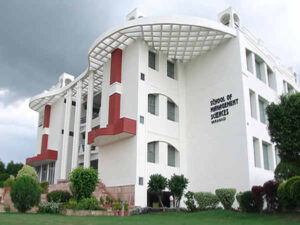
Most students who do 10+2 with the Science-Math stream strive to become engineers – and Computer Science Engineering is the hottest branch these days. However, BCA + MCA is also a good option if you are considering a future in one of the top IT careers.
It’s easier and more cost-effective!
In this article, we will cover the strengths and career options of both of these study options and see how to shine in IT jobs with a BCA + MCA route!
Quick Comparison of B.Tech (CSE) vs BCA + MCA
Alt: B.Tech (CSE) vs BCA + MCA
In the first two years of the B.Tech (CSE) program, students focus on Math, Physics, and Engineering Principles. While BCA students start with coding and application development courses right away. Let’s compare BCA + MCA and B.Tech in CSE programs in greater detail:
| Feature | B.Tech (CSE) | BCA + MCA |
| Duration | 4 Years | 5 Years (3 years BCA + 2 years MCA) |
| Focus | Strong foundation in computer science with engineering principles | More emphasis on practical application development |
| Entry Requirement | 10+2 with high marks in Math and Science (usually requires entrance exams like JEE Mains/Advanced) | 10+2 (may or may not require entrance exams for BCA) |
| Coursework | Programming LanguagesData Structures & AlgorithmsComputer ArchitectureOperating SystemsDatabase Management SystemsDiscrete MathematicsNetworks & CommunicationEngineering subjects like Physics, Chemistry, etc. | Programming LanguagesWeb DevelopmentDatabase Management SystemsSoftware EngineeringNetworkingElective courses, such as Cloud Computing, Data Mining, Data Analytics, Cryptography & Network Security, etc. |
| Industry Readiness | Generally considered more industry-ready due to additional years of projects | May require additional skill development or internship experience |
| Job Prospects | A wider range of career options, including software development, hardware design, and research | Strong in software development, web development, database administration, and system analysis |
| Cost | Generally more expensive, especially at top engineering colleges | Can be a more economical option |
| Competition | Highly competitive due to its popularity | Less competitive compared to B.Tech (CSE) |
Career Prospects after B.Tech in CSE vs. MCA in Indian IT Companies
Both B.Tech (CSE) and MCA graduates have bright prospects in the booming Indian IT sector. However, there are some key differences in the career paths they can pursue:
Common IT Jobs for Both:
- Software Developer: This is the most common role for both B.Tech (CSE) graduates and those who have done BCA + MCA graduates. Responsibilities include designing, developing, testing, and maintaining software applications.
- Web Developer: Involves designing, building, and maintaining websites and web applications. Both B.Tech (CSE) and MCA graduates with relevant skills are in demand in this field.
- Database Administrator (DBA): Manages and maintains databases, ensuring smooth operation and data security. This role is open to both B.Tech (CSE) and those who have done BCA + MCA with expertise in database management systems.
- System Analyst: Analyzes business needs and designs IT solutions to meet those needs. Both B.Tech (CSE) and MCA graduates with strong analytical skills can excel in this role.
Unique Opportunities for Computer Science Engineering Graduates:
- Computer Hardware Engineer: Designs, develops, and tests computer hardware components. Requires a strong understanding of electronics and computer architecture, which is emphasized more in B.Tech (CSE) programs compared to BCA or MCA.
- Embedded Systems Engineer: Deals with designing and developing software for embedded systems like microcontrollers used in various devices. A B.Tech (CSE) degree with a focus on hardware-software integration is beneficial for this role.
- Research & Development (R&D) Roles: Opportunities in research labs or R&D departments of IT companies often require a strong foundation in computer science principles, which B.Tech (CSE) programs provide extensively.
Unique Opportunities for BCA + MCA Graduates:
- Enterprise Application Developer: Develops and manages complex software applications used by large organisations. MCA programs often have specific courses on enterprise application development, making graduates well-suited for this area.
- Business Analyst (BA): Bridges the gap between business and IT by analysing business needs and translating them into technical requirements. MCA graduates with strong communication and business acumen can excel in this role.
- IT Project Manager: Manages and coordinates IT projects, ensuring timely completion within budget. MCA programs may offer project management courses, giving graduates a head start in this field.
In the Indian IT job market, both B.Tech (CSE) and MCA graduates are generally viewed positively by recruiters, but there can be some subtle differences in perception. Computer Science Engineering graduates are perceived to have a well-rounded technical background with a strong foundation in mathematics, physics, and engineering principles. Hence, they are considered more suitable for IT jobs that require a hardware or software-hardware interface or R&D focus.
Those who have done BCA + MCA are thought to have better practical application development and coding skills. Recruiters might even prefer them for IT careers like software development, web development, and database administration, especially if they are looking for more cost-effective options or specific IT specialisations.
How do you get an edge over B.Tech (CSE) graduates if you opt for the BCA + MCA route?
Alt: How to compete with Computer Science Engineers in IT careers?
- Choose a Specialization in your MCA: While B.Tech (CSE) offers a broad foundation, many MCA programs allow specialisation in high-demand areas like Data Science, Cloud Computing, Cybersecurity, or Mobile App Development. Deep expertise in these areas can make you highly sought-after for specific IT jobs.
- Develop Strong Programming Skills: While BCA and MCA programs teach programming languages, take the initiative to learn additional languages and frameworks relevant to your chosen specialisation. Build a strong portfolio showcasing your coding skills through personal projects, participation in hackathons, or contributing to open-source projects. Sites like GitHub can serve as a platform to demonstrate your coding prowess.
- Seek Internships: Don’t underestimate the value of internships during your BCA and MCA studies. Internships provide valuable hands-on experience in real-world IT projects. This experience gives you a significant advantage over Computer Science Engineering graduates who might have a stronger theoretical foundation but less practical exposure.
- Look for Freelance Opportunities: Freelance projects can also provide practical experience and allow you to build a client base. This demonstrates your ability to work independently and deliver results, which is highly valued by IT employers.
- Focus on Soft Skills: While B.Tech (CSE) programs might emphasize technical skills, don’t neglect developing strong communication and teamwork abilities. These are essential for success in most IT careers. Take courses or participate in activities that enhance your communication and collaboration skills.
- Network with Professionals: Actively participate in industry meetups, conferences, and workshops related to your chosen specialisation in IT. This allows you to network with professionals, learn about current trends, and potentially gain valuable mentorship opportunities.
- Focus on Specific Skills: Tailor your resume and cover letter to highlight the specific skills and experiences you’ve gained through your specialisation in the BCA + MCA program. Showcase how these skills make you a perfect fit for the IT job you’re applying for.
While a B.Tech (CSE) might offer a broader foundation, a well-rounded BCA + MCA graduate with a strong skill set in a specialised area, practical experience, and well-developed soft skills can definitely get good IT jobs in the Indian market.




